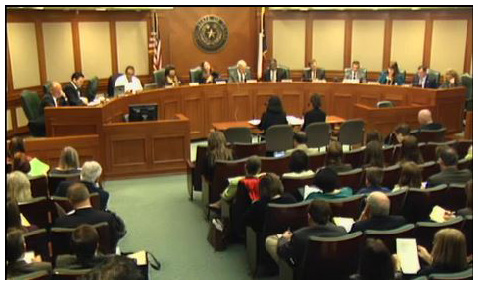 Some lawmakers raised questions this week about whether school districts around Texas have the kind of resources they'll need to fully implement sweeping education reforms signed into law last year. Starting this fall, students will have several new options for which path they'd like to take to earn a high school diploma. But whether those kids and their parents will receive adequate guidance up front about their choices has become a point of contention.
Some lawmakers raised questions this week about whether school districts around Texas have the kind of resources they'll need to fully implement sweeping education reforms signed into law last year. Starting this fall, students will have several new options for which path they'd like to take to earn a high school diploma. But whether those kids and their parents will receive adequate guidance up front about their choices has become a point of contention.
The flexibility in graduation plans was part of a broader education reform package that got a “yes” vote from all of the 181 members of the Texas Legislature. Following some speculation that he might veto the bill, Governor Rick Perry ended up signing it. At the time, Perry said lawmakers had found an “appropriate balance between a need for rigorous academics and flexibility.” Many in the business community, the construction industry chief among them, support the reforms because of the growing skills gap in which unemployment in many areas is high but companies are nevertheless unable to find enough skilled labor.
“I'm a little concerned that some students may be left out,” said Representative Harold Dutton, D-Houston, during a hearing of the Texas House Public Education Committee on Wednesday. The committee is expected to hold several hearings on this issue between now and the next time lawmakers meet in their regular legislative session in 2015. Despite the great interest in the issue across the state, the chairman of the committee said that he expects to hold no field hearings. All of them will be conducted at the Texas Capitol. “Right now the plan is Austin,” said Chairman Jimmie Don Aycock, R-Killeen.
Representative Dutton pointed out that there is nothing in the new law to require that every single campus in Texas offer all of the various graduation plans, called “endorsements”. Instead, it was noted that the law requires every school district to offer the graduation plans including science, technology, engineering, and mathematics (STEM), Business and Industry, Public Services, Arts and Humanities, and Multidisciplinary Studies.
Right now, there is a 400 to 1 ratio of students to counselors in Texas, which of course means that setting each kid on the right path for their individual needs may be a real challenge at first. That’s why Dutton and Representative Alma Allen, D-Houston, questioned whether students will have a chance to be fully informed of what’s possible in their educations.
“Have we built a trap for our kids to fall into?” Allen asked. Neither she nor Representative Dutton sounded like they are against the concept of creating multiple pathways to a diploma, but they certainly sounded skeptical of whether the state has adopted a law that can be implemented in a way that makes sense.
State Board of Education Chairwoman Barbara Cargill, R-The Woodlands, said that the Democrats had raised a valid concern. Cargill said, however, that the Legislature should be able to provide the Board of Education with some guidance on how to equip counselors across Texas for the challenge.
Officials from the Texas Education Agency said that the new law requires each school district to fully explain the graduation plans to students and their parents. Counselors will no doubt play a role, said Monica Martinez with the TEA, but figuring out who specifically is responsible was left to local school districts.
Despite concerns from some that there will be too many students who choose the new “foundation graduation plan” – which will be the minimum plan to get a diploma – there was testimony on Wednesday that suggested it won’t be a problem. One educator told the committee that many of his students have started to get wind of the fact that they’ll be able to sign up for different graduation plans. Many of them, he said, are thrilled that they’ll get a greater say in plotting a course for their future.
More Resources May Be Needed For Texas Education Reforms to Work
by Scott Braddock | March 27, 2014



Add new comment